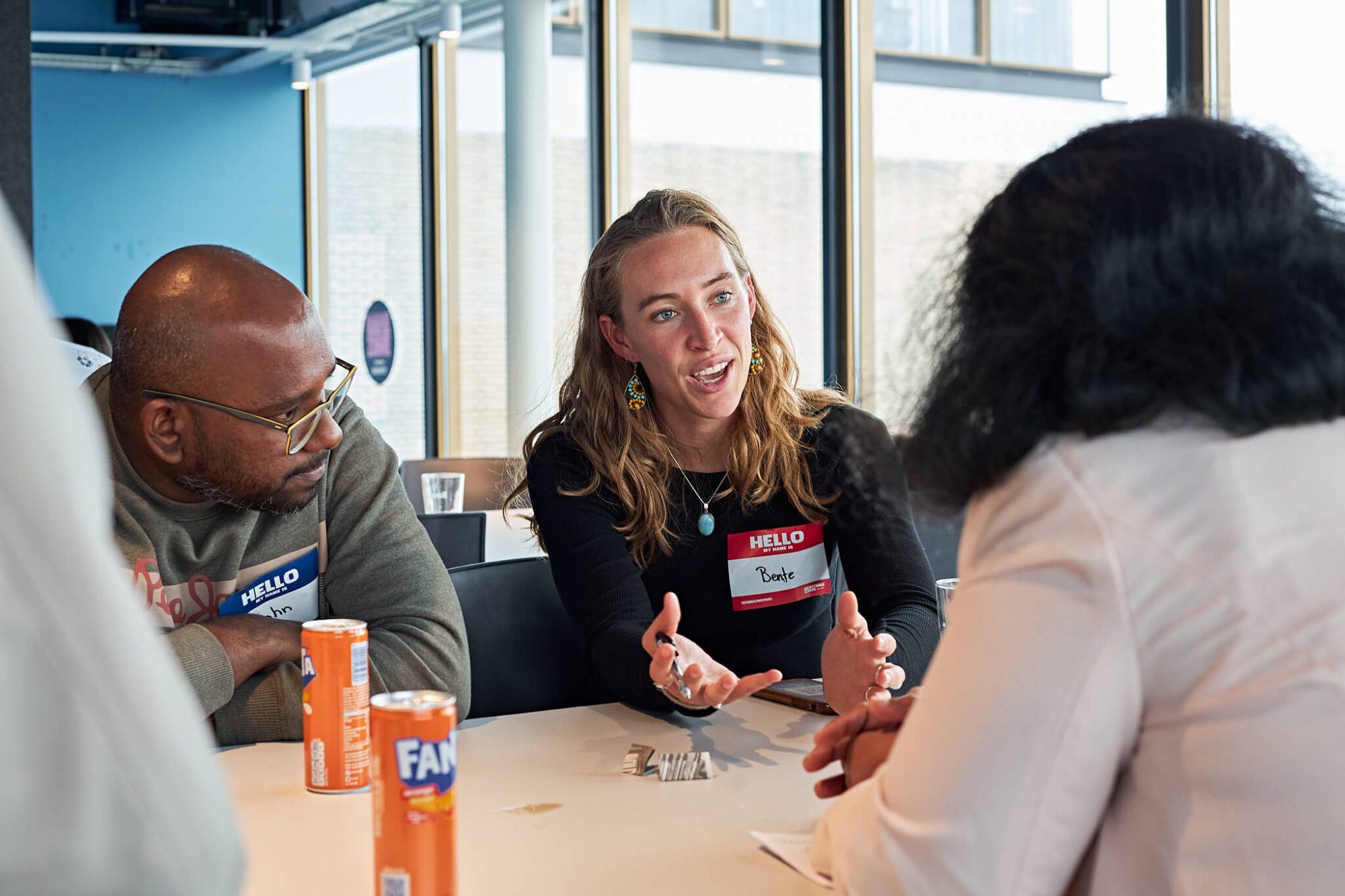How to prepare for a job interview: 4 steps
Check out our step-by-step guide to prepare for a successful interview: one that will impress your potential employer in the Netherlands!

You drafted a professional CV, and a tailored cover letter and sent them off to your (dream?) company. If your profile piqued the hiring manager’s interest, chances are, you’ll be invited to an interview!
Interviews are notoriously stressful for many job applicants: they require a lot of self-confidence and cool nerves.
Fortunately, there is a simple way to build up this confidence: preparation! Indeed, thorough preparation will have a great impact on your performance and increase your chances of impressing your interviewers.
This article presents 4 steps you can follow to prepare for your next job interview in the best possible way.
If you’re not at the interview stage yet, make sure to check out our articles on how to write a professional CV or draft a tailored cover letter.
Netherlands-specific advice
An interview with a Dutch company won’t differ much from a typical job interview. You will be expected to demonstrate your enthusiasm for the role, knowledge about the company and the skills and experience you can bring to the table.
That being said, keep the following in mind when reading our article and preparing for your job interview:
- Prepare for detailed questions: the Dutch usually don’t spend much time beating around the bush. You can expect direct questions. To answer these questions in the best possible way, prepare concrete examples and data to back your arguments.
- “Blah blah” won’t get you far: in relation to the previous point, most Dutch recruiters will see right through people who say a lot without saying much. Make sure you back each argument, previous experience, or skill with a concrete example.
- Think about what you can contribute to the culture: Dutch companies are renowned to have egalitarian organisational cultures, where employees are expected to collaborate and contribute equally. Prepare ideas on how you can contribute to the company’s culture!
Steps to prepare for a job interview

1. Thoroughly research the company
The first step to preparing for your job interview is conducting deep research about the company. Remember: knowledge is power! A candidate who knows about the company’s values, culture, history, and latest news will often make a greater impression than those who limited themselves to reading the organisation’s mission statement.
Here are the elements you want to learn more about:
- Your interviewer or hiring manager (on LinkedIn private mode)
- The company's history, mission, vision, and latest news (on the company website and news articles)
- The organizational culture (on the company website and news articles)
- The team or department in which you would be working (on LinkedIn and the company’s website)
Let us dive into each of these points in the sections below.
a) The interviewer/hiring manager
When applying for a position within a company, it's important to keep in mind that the interviewer is the first person you need to impress and persuade.
Establishing a sense of familiarity with the interviewer can create the impression that they know you better, such as if you went to the same school or share similar interests.
How you can do this is by checking out your interviewer’s LinkedIn profile (in private mode), to get familiar with his or her background. Who knows, perhaps you attended the same university? Grew up in similar countries?
Knowing more about your interviewer will give you better insight into how to build rapport during the interview.
b) Company history, vocation, and latest news
The next important subject you need to document yourself on is the company. When was it established? By whom? Which factors have contributed to the firm's growth and development? Has there been recent funding? Strategic partnerships? What are the firm’s mission and vision?
To obtain a brief overview of important highlights, you can use resources like Wikipedia, the company's website, social media accounts, and press releases, or simply do a Google News search of the company name.
To make the most of this information, consider how the position you're applying for and the relevant department are influenced by these events. Use this information to prepare thoughtful interview questions to ask during the interview.
c) Company culture and values
If you get the job, you’ll be spending the better part of your days with your colleagues, teams, and superiors. You won’t need to be the best friends in the world, but you’ll at least share similar values and visions of organizational culture.
Ideally, you already know you would be a good fit for this company. The next step is to show the interviewers that you understand the organizational culture and that your way of working fits right into it.
Understanding the company culture can aid in tailoring your presentation to align with the company's preferred language, phrases, and values.
Ultimately, showcasing your strong knowledge and compatibility with the organizational culture can leave a positive impression on the hiring manager and help establish a connection.
d) Read about your potential team and department
If you properly research the above, you’re off to a pretty good start. If you want to take it a step further, research more about the team you would be collaborating with, the projects they are working on, and what your role in the team would be.
If you’re applying for a role with the Marketing team, for example, visit the company’s website to get acquainted with the structure of this department. How many team members are there? Where are they from? What are their roles? Feel free to also used LinkedIn to visit their profiles and get a feel of who you would be working with.
If you can’t find the above information, that’s fine! These are great questions to ask your interviewer.
In sum:
- Find out more about the structure of the team (number of members, hierarchy, etc.)
- Research recent and ongoing projects in the relevant department
- Make sure you understand which role the department plays in the firm's strategy
2. Prepare your personal value proposition
Once you’ve conducted thorough research on the company, it's time to focus on yourself. After all, a job interview is a lot about selling yourself. The recruiter will want to hear why you’re the best candidate for this job and what you can bring to the team.
In order to answer these questions in the best possible way, we advise you to think of questions you may be asked and how to answer them.
Write these questions and answers on a piece of paper or in a Word document and start building a pitch in your mind. This may sound silly, but it works: picturing the interview in your mind and how you’re planning on selling yourself will help you build confidence.
Here are examples of questions you’ll need to have solid answers for:
- Why did you apply for this role?
- Why do you think you’re the best candidate for this role?
- Do you have experience in [task x]? Task [y]? Task [z]?
- How do your values align with our company’s?
- Where do you see yourself in 5 years?
- Why did you opt for this career path?
- Tell us about yourself
Remember: preparation is key! Take time to build your pitch, this will help you build confidence and may even make the interview feel like a walk in the park.
3. Prepare questions, high-quality ones
Apart from professionalism, ambition, and a high level of knowledge, hiring managers seek candidates who display curiosity.
To demonstrate your genuine interest in the organization, we recommend you prepare a minimum of 10 questions regarding the employer, job description, company history, and career opportunities.
This doesn't mean that you have to ask all 10 questions during the interview. Rather, it is advised to prepare a list of questions to ensure that you have sufficient queries in case the interviewer already addresses some of them during your conversation.
When preparing your questions, ensure that they are personalized and tailored to the position you are applying for, similar to how you personalized your CV and cover letter. Incorporating the team, department, or company name, for instance, can help personalize your questions and make them more specific rather than asking generic questions.

4. Practice!
Even if you have been to several interviews, it is always beneficial to practice, especially if the upcoming interview is for your dream job.
To prepare, select a friend or family member (who you know is good at constructive feedback) for a mock interview. Ask them to prepare questions for you, questions that you are likely to face in the actual interview. While practising may feel awkward, it is an excellent opportunity to refine your pitch and create a strong personal brand.
During your practice sessions, focus on presenting your skills, career history, previous job experience, and knowledge of the job position.
Ask the person interviewing you to challenge you with questions that the actual interviewer might ask, such as:
- Can you tell me about yourself?
- How does your work experience make you a good fit for this job?
- What are your major accomplishments in your career so far?
- What skills do you possess that are relevant to this position, and how will they help you succeed?
- Why should the company choose you over other candidates?
- What would your previous employers say about you as a person?
- Why are you particularly interested in this job?
- Are you interviewing with any other companies?
- What are your salary expectations?
By practising in this way, you can build your confidence and prepare yourself for the actual interview.
Wrap up
It’s a wrap! We hope this article provided you with stimulating advice on how to best prepare for a job interview.
We cannot stress it enough: preparation is key! Just like exams, job interviews can’t be prepared for the night before. They deserve at least 2 days of preparation (in our experience) and need to be rehearsed.
Finally, we advise you to keep the tips above in mind. You don’t want to ruin all your preparation with a “Hi y’all!” as you walk in. Really finally: you’ve got this!






